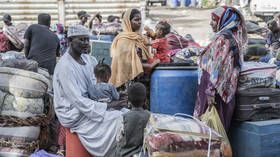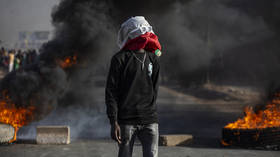Sudanese refugees report increased ethnic cleansing in Darfur

Sudanese nationals fleeing hostilities in the West Darfur region have accused the Rapid Support Forces (RSF), the paramilitary group fighting the country’s army, of ethnic killings, Reuters reported on Wednesday.
The RSF, which has taken over the main army base in the region’s capital El Geneina, and its allied Arab militias have targeted the Masalit ethnic group in Ardamata, which is home to an internally displaced people camp, the outlet added, citing the accounts of three witnesses.
The witnesses are said to be among 7,000 refugees, including women and children, who crossed from Darfur into the Chadian city of Adre, about 17 miles west of El Geneina, in the first three days of this month, according to Doctors Without Borders (MSF).
The armed conflict in Sudan’s capital Khartoum began in mid-April after months of tensions between SAF chief General Abdel-Fattah Burhan and the commander of the RSF, General Mohamed Hamdan Dagalo. It has since spread to other parts of the Sahel nation, including the already unstable western Darfur region. In June, the state’s governor, Khamis Abdullah Abakar, was assassinated for allegedly accusing the RSF of ethnic cleansing.
Last month, the UN said up to 9,000 people had been killed and more than 5.6 million others had been forced to flee their homes in the past six months due to the violence. UN humanitarian chief Martin Griffiths expressed concern about alleged “horrific” reports of sexual violence and escalating clashes along ethnic lines, particularly in Darfur.
On Tuesday, medical charity MSF reported an increase in fighting between the RSF and rival SAF in the West Darfur state, where a bloody civil war between the Arab-dominated Sudanese government and rebel groups ended two decades ago.
“El Geneina experienced a nightmarish escalation of violence last June, and it pushed a large proportion of the city’s inhabitants to flee to Chad, despite the many dangers and attacks that awaited them on the road,” said MSF project coordinator in El Geneina, Alkassoum Abdourahamane.
“The city then experienced a relative lull and even hosted displaced people from other locations. Now, the blasts and the fear have once again taken over,” Abdourahamane added.
Dominique Hyde, director of external relations at the UN Human Rights Council (UNHRC), who also visited the North African country last week, said the brutality had turned homes into “graveyards.”
The UN official said the fighting in the Darfur region had resulted in even more displacement, with thousands struggling to find shelter and many sleeping under trees by the roadside.
“It is shameful that the atrocities committed 20 years ago in Darfur can be happening again today with such little attention,” she said.
Meanwhile, the International Criminal Court began an investigation into alleged war crimes and genocide in Darfur in July, following a UN report of the discovery of mass graves containing the bodies of 87 ethnic Masalit members allegedly killed by the RSF and allied militia.













